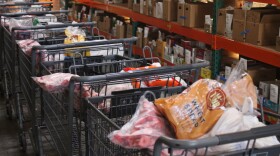-
The measure would allow incarcerated people nearing release to apply for SNAP, and allow those convicted of a felony drug offense to be eligible regardless of their treatment status.
-
Hawaiʻi Foodbank is set to receive $5.5 million from the state Legislature. The funding comes from Act 310 – the Legislature's grant program that allocates $50 million in relief to nonprofits impacted by federal funding cuts.
-
On today's program, we're sharing stories we reported on the scene and in the field, from rural Kauaʻi to downtown Chinatown.
-
Office of Hawaiian Affairs Chair Kai Kahele spoke to HPR's Catherine Cruz about the renewal of military land leases and what happens to OHA’s emergency relief program now that the government shutdown has ended.
-
Human Services Deputy Director Joseph Campos II spoke to The Conversation’s Catherine Cruz about what SNAP recipients need to know about receiving money in their accounts.
-
The state Department of Human Services provides the latest on what SNAP recipients need to know about their benefits; The Aloha Vintage Base Ball Association host their inaugural game
-
The organization reports an increase in need over the past three months and prepares for continued growing demands as government shutdown continues and holidays approach.
-
This comes amid continued uncertainty of benefit distribution for the Supplemental Nutrition Assistance Program, also known as SNAP.
-
Today, we're hosting a panel discussion on SNAP benefits and other impacts of the government shutdown. Have a question or a comment? Email talkback@hawaiipublicradio.org or leave a voicemail on our talkback line at 808-792-8217.
-
Staff and volunteers at The Pantry in Kalihi create more food assistance options for furloughed federal workers; Kauaʻi writer Jonathon Medieros shares the intention behind his poem "To the People on the Cruise Ships"
Play Live Radio
Next Up:
0:00
0:00
Available On Air Stations








